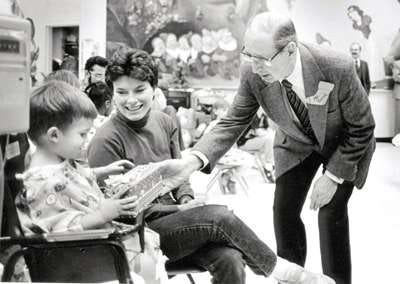Thirty-six years ago this week, a certain two-year-old stood holding the rails of his crib, wheezing. Inexplicably, he was up too early. His mom called the pediatrician's office and was told it must be the croup. She was advised to put him in the bathroom full of steam, then bring him to the office when it opens at 8 a.m.
She followed instructions and waited in the doctor’s office when it opened. The doctor was late. The nurse who was supposed to be there wasn't. The mother held her son as he fought to breathe.
"The doctor is on his way," the office receptionist said when asked repeatedly where he was, not sensing the gravity of the situation.
Instinct, a powerful force, took over. The mom stood up and announced they were going to the emergency room. The two-block drive in winter weather seemed to take forever.
As she entered the hospital, the infant's body went limp, and his eyes rolled back.
Elly, an emergency room nurse, snatched the boy. What unfolded was a blur of white-coated doctors and nurses surrounding this tiny being.
The mom was hustled into a small, windowless room to wait. And wait. And wait.
It dawned on her why she wasn't in the general family waiting room. The worst news a parent can hear is not something to tell within earshot of others.
The phrase 'minutes seemed like hours' is a cliche until lived.
Elly, the nurse, and a doctor who happened to be in the area with the expertise to intubate an infant, then days in an Intensive Care Unit, saved that baby's life. He had epiglottitis, an inflammation of the epiglottis that causes swelling, which blocks air to the lungs. Untreated, it can be fatal.
I was that mom and my son is now 38. This is my most vivid Christmas memory.

In those days when he was in the ICU, I realized how fortunate we were in so many ways. I didn’t have to think about being late for work to take my son to the doctor. I made my own hours and got the job done on my own schedule. This wasn’t the case for other parents, I discovered. Most of the children rarely had visitors. At first, I was judgemental: how could these kiddos be left alone? The nurses explained their parents didn't have the job flexibility to take time off to be with their critically ill children. Ah ha.
I am haunted by the cries of terrified kids, tied to tubes, without a loved one to hold them. What long-term psychological and physical impact did this have?
Parental leave is one piece of the Build Back Better bill that might seem just another policy issue until you've had a lived experience to understand it is imperative.
There are children in hospitals today whose parents cannot be with them. They are traumatized. The treatment or lack thereof, the feeling of abandonment, will be a part of them going forward, and at a potentially huge cost.
If money is the priority, understanding the price of not providing parental leave goes far beyond the crisis point.
The story isn’t about one man from West Virginia, or price tags, or midterms, or anything other than what the Build Back Better bill does.
All the pieces of the legislation and the intended impact can be told through countless personal stories like this.
The people are what it is about.
Enrollment is now open for the 2nd Annual Okoboji Writers’ Retreat:





Great column, Julie. And hurrah for Elly the nurse, the docs, you and most of all, Thomas! Life is good! Actually you stopped me in my tracks to read this. It took me back to a frantic dash to Blank Hospital when the baby Andrew Offenburger was seizuring with a fever. Whatever I promised God that night if Andy could be healed, I sure as hell hope I delivered.
Even with this beautifully written memory, I can't begin to fathom what a terrifying experience for you this must have been as a young mother with a seriously ill child. Not to mention illustrating how horrifyingly frightened and alone those other children must have been.
What a powerful cry for (and just for one very important aspect of many in the legislation) the Build Back Better Bill to be passed. This is exactly the kind of experience shared that could move the needle in helping the public understand what the bill could provide and why we need it. Thank you!